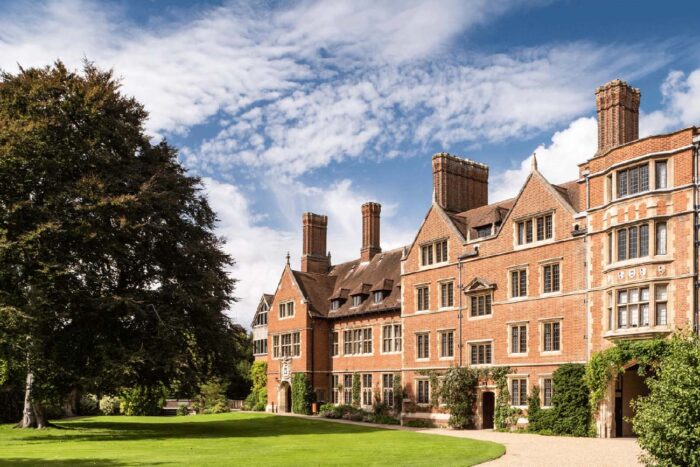How to Apply

We welcome you to apply to Trinity Hall, whatever your educational background. Make the most of our advice on this page to ensure you understand everything you need to do before and during the application process.

Choosing a Course
Take your time to choose the right course. At university, there are a number of subjects you can study that aren’t available at school or college. Think about your strengths, passions and future career ideas to find the right course for you. If you make a good choice for your circumstances, this will shine through on your application form, and will drive you to succeed. Explore the options on our course pages.
If you have any questions, please don’t hesitate to email our admissions team.
Choosing a College
Your college will become your base and a home-from-home for the duration of your degree. While each college has its own feeling, most students are not disappointed by their choice of college. Consider things such as whether you want a larger or smaller college, and if you’d prefer to be in a particular location.
Many applicants wonder if some colleges are easier or harder to get into than others. However, the university’s application process is designed to ensure that this is not the case, and there is sufficient moderation across all colleges that the best applicants are successful regardless of which college they apply to.
Personal Statement
The personal statement on your UCAS form is your opportunity to tell us why you’re interested in the course, and what you have done to develop your understanding of your chosen subject. At Cambridge we are particularly keen to hear about your academic pursuits and how they relate to your chosen course, so make sure the academic aspects take up more space than your non-academic achievements on the form.
As well as the UCAS personal statement, you will also have an opportunity to complete an additional personal statement on My Cambridge Application. You do not have to write one, but it may be useful if you want to say something specific about the Cambridge course you are applying for, especially if you are applying for different courses elsewhere.
Written Work or Portfolio
We sometimes require written work or a portfolio to be submitted during the application process. Look at the entry requirements on the web page for your particular course to see if this will be necessary for your course. You do not have to send this work before applying; we will write to you after you have applied and let you know exactly what you need to send and when.
Make sure you keep a copy of the work you send in to refresh your memory before the interview. Sometimes an interviewer might want to ask questions about the work you have sent in.

Admissions Assessments
Some applicants are required to take a written admission assessment. You can find out what kind of assessment you’ll be asked to do on the course web page. The course-specific written assessments are designed to supplement the information in your application and to gauge your abilities. This is to assess skills (such as comprehension and thinking skills) and, where appropriate, levels of current knowledge and understanding relevant to the course for which you have applied. Your written assessment will be taken into account alongside the other elements of your application.
Some subject require you to register in advance. The deadline for registration may be late summer or early autumn, so be prepared and check early.
Interviews
We interview everyone with a realistic chance of being offered a place, and this is an important part of the application process.
At Trinity Hall, applicants are usually given two interviews that last around twenty-five minutes, each with two interviewers. The interviews are all academic in nature. The questions asked will range from topics that you have already covered at school, to new material that you have not seen before. The interviews are designed to get you thinking and discussing. We want you to enjoy the conversation and recognise that a relaxed candidate is likely to leave a truer impression of themselves than one who is tongue-tied with nerves!
Interview Format: for the 2025-26 admissions round, UK applicants will be invited to an in-person interview in Cambridge, whilst applicants outside the UK will be invited to an online interview.
Sample Interview Questions
In this video, Marcus goes through a variety of sample interview questions to show the style of questions that could be asked in your Cambridge interview.
Subject-specific interviews
The Winter Pool
If you apply for a course at a particular college and are unsuccessful with that college, you may be entered into the Winter Pool. This is the University’s moderation process to ensure that all applicants who have the potential to succeed at Cambridge have the opportunity to be offered a place, regardless of whether they applied to an oversubscribed college or a college with a very strong field of applicants. This process takes place in early January.
If you are ‘fished’ from the Winter Pool, you may be offered a place on your course with a different college, or a similar course at a different college – for example, an applicant for History & Modern Languages may be offered a place for History if the Admissions team at that college believe they are stronger in History than Modern Languages.